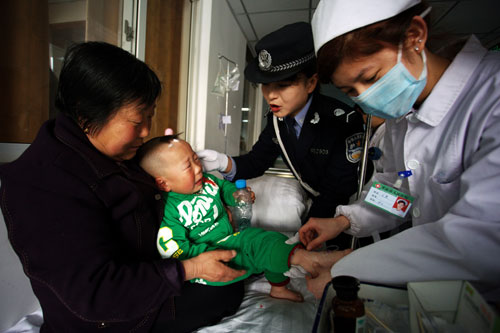Society
Tainted milk kills 3 kids, sickens 35
By Qiu Bo (China Daily)
Updated: 2011-04-09 07:36
 |
Large Medium Small |
Poisoning may be result of crime or accident: Officials

BEIJING - Three babies died and 35 other people, mostly children, were left ill in a Northwest China city by an outbreak of food poisoning believed to be linked to tainted milk, the local government said on Friday.
A preliminary investigation showed victims in Pingliang city, Northwest China's Gansu province, suffered from nitrite poisoning after drinking milk, a local government statement said.
Nitrite is a chemical used to make dyes and to preserve meats.
According to the statement, two dairy farms have been shut down and the managers are being investigated.
A publicity official from the city government, who requested anonymity, told China Daily that local police have detained a suspect in his 40s, surnamed Ma, who is believed to have supplied the tainted milk to the victims.
Ma is an independent dairy farmer who has sold homemade dairy products in his own neighborhood for years, according to the official.
"The man thought that he had been wronged and insisted that he was not aware of what had happened to his farm and milk," he said.
The official said it's unclear whether the milk had been tainted by an intentional crime or simply by improper storage.
The 35 people made ill by the milk were being treated at two hospitals in Pingliang on Friday morning. Most of them are children younger than 14, according to a press release from the city government and local health bureau.
The release said one of the patients was in a critical condition and the others were stable.
Previously, the No 2 People's Hospital in the city had said authorities had found that the tainted milk contained an excessive amount of nitrite salt, an additive that can be used legally in pickles and other foods but not in dairy products.
In June 2010, a woman in Zunyi of Southwest China's Guizhou province put nitrite salt into milk by mistake and caused her 4-year-old nephew to die.
Six months later, Chengdu, capital of Southwest China's Sichuan province, saw a family of three poisoned after they ingested nitrite salt deemed to be not suitable for cooking. Among the three was a 2-year-old child, who died later.
Wang Dingmian, former chairman of the Guangdong Provincial Dairy Association, said people with weak immune systems, such as infants and children, are particularly susceptible to nitrite-salt poisoning.
Wang said the nitrite salt found in the milk this time probably came from the food eaten by dairy cows. He said it will be very difficult to ascertain whether the poisoning resulted from a crime or an accident.
Li Tao, a doctor from a national-level dairy lab, told China Daily that official bodies charged with food supervision routinely test dairy products, which may not contain nitrite salt, according to current regulations.
He said nitrite salt, besides being poisonous in excessive amounts, contains high level of carcinogenic substances that threaten the health of adults.
"The Food Safety Law has restricted both independent dairy farmers and small plants that don't have licenses from selling dairy products on the market," he said.
He said much of the blame for the poisonings lies with the local supervision bodies charged with ensuring the safety of dairy products.
Li insisted the recent poisoning is an isolated accident and won't affect the rest of the dairy industry.
China's quality inspection agency last week ordered nearly half of the nation's dairy firms to cease operating as part of a campaign to clean up the industry.
Last month, the country's largest meat processor was forced to apologize when clenbuterol was found in some of its pork products. The illegal additive can cause dizziness, heart palpitations and profuse sweating.
Other recent scandals have involved contaminated red wine, bleached mushrooms, fake tofu and recycled cooking oil.
In 2008, at least six children died and nearly 300,000 fell ill from powdered milk laced with melamine, an industrial chemical added to low quality or diluted milk to make such products seem to contain larger amounts of protein than they really do.
Xinhua and AFP contributed to this story.
| 分享按鈕 |